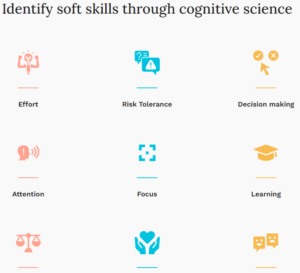Emotional Intelligence in the Workplace
The most sought-after qualities in new job candidates have long included points such as education, motivation, experience, dependability, and confidence. More recently, emotional intelligence and other soft skills have entered the roster as the most desirable traits in individuals in today’s workforce. Emotional intelligence, or EQ, plays a vital role in any employee’s ability to perform effectively as part of a professional team.
Emotion and personal connection has long been a somewhat taboo topic in the workplace — this outdated idea suggests that interpersonal interaction beyond the extremely professional is unproductive at best, and detrimental at worse. But this couldn’t be farther from the truth. As it turns out, emotionally intelligent employees or groups with high EQ are more productive and more successful than those without. Active awareness and empathy foster team bonding and collective motivation: everyone is working for the success of the group, and the company at large. It is in the best interest of businesses everywhere to bring on employees with this all-important trait.
What is Emotional Intelligence?
Simply, emotional intelligence is defined as the “ability to identify and manage one’s own emotions, as well as the emotions of others.”1It is a similar concept to empathy, or the ability to understand and feel what those around us are feeling, but applied to the self as much as to other people.
Having emotional intelligence means being able to understand if and why something is making us feel angry, or sad, or even joyful, and then being able to deal with that emotion in a productive and healthy manner. EQ is what allows employees to have conflict with coworkers or supervisors, and then respectfully come to a mutually agreeable solution. It’s what enables us to compromise on projects, communicate unmet needs to our supervisors, and express concerns about our own ability to perform.
Emotional intelligence additionally plays a central part when it comes to solving problems and achieving success on the job. People with high EQ are better able to experience frustration during a difficult project and power through anyway. And emotionally intelligent individuals in positions of leadership will be better at handling and mitigating upset within their team, and guiding everyone to a successful finish.
The importance of EQ in the workplace cannot be understated.
The Value of Emotional Intelligence in the Workplace
There are four distinct categories of emotional intelligence which each offer unique benefits within a working environment.
Self Awareness allows us to understand ourselves. An employee with self awareness has an articulate understanding of their own strengths, weaknesses, drivers, values, and their impact on others in the workplace. Their intuition is sharp, and they have a good sense of how they fit into any given project or role. They appreciate receiving constructive criticism, and are highly motivated to improve their own performance, and to be a positive influence on the rest of the workforce.
Self Management enables us to feel negative emotions and prevent them from having a disruptive impact. An employee with good self-management skills will never let frustration or anger get in the way of them doing their best work. Additionally, they will feel comfortable bringing problems within the workplace to management’s attention, and speak up for themself and others in an appropriate and professional tone. As a leader, they will encourage and guide their team through failure while maintaining morale and team spirit.
Social Awareness is what makes us great team players. An employee with acute social awareness can tell when others are uncomfortable, disengaged, or aren’t saying something they want to say. They put the wellbeing of the group before their own success, and will make space for group thought by facilitating a truly collaborative environment. They are service oriented, a great listener, and particularly good in public-facing roles.
Relationship Management is at its most basic applied empathy. An employee with relationship management skills is automatically an expert in conflict resolution. They can remain calm in the face of another’s distress, and will be able to diffuse the situation through humor or empathetic listening. They are highly influential in the workplace, and usually make great candidates for management positions.
How to Use Emotional Intelligence in the Workplace
As a Leader
If you’re a leader at your company, you likely have a high EQ. That’s because leaders must use emotional intelligence every day at work. CEOs and individual team managers alike must set the first behavioral example for the rest of the group, engaging your employees the way you want them to engage with you and each other. Additionally, you have to be careful to consider the emotions of others — showing your employees you respect them is the best way to gain respect, yourself.
Giving a Performance Review
Unfortunately, feedback goes nowhere unless you give it with tact and social awareness. Understanding what your employees need and how they feel about themselves and their work can help you determine the most effective way to relay constructive criticism. Exercising empathy, and using self management if your employee becomes upset can help motivate them to do their best and continue to succeed.
Receiving Feedback
It can be difficult to receive negative feedback. Especially if you thought you were doing a good job. But feedback is just an opportunity to improve, and while you might have a knee-jerk reaction when someone else tells us how we failed them (we all do sometimes) with self awareness and self management we can react appropriately, and harness feedback to better yourself and become a more effective team member.
As a Hiring Manager
Assessing a candidate for EQ skills is the real challenge. Emotional intelligence is something that can be taught and coached, but hiring new employees who are emotionally intelligent off the bat saves time, money, and a lot of energy.
To help employers assess EQ and other durable human skills, pre-hire assessments backed by science can add objectivity and predictability to hiring decisions. For instance, Harver’s gamified behavioral assessment identifies soft skills through cognitive science wrapped in an engaging game-like interface.

Emotional intelligence expert Jen Shirkani recommends asking one question during an interview to assess EQ: “Have you ever unintentionally offended or upset someone? Please provide details.” This question tests the candidate’s self-awareness, as well as their ability to address conflict and exercise empathy. If they struggle to find an answer, they most likely have weak EQ. If they give you a detailed story, admitting their mistakes and explaining what they did to rectify the situation, you may have found leadership material.
Final Thoughts: Emotional Intelligence in the Workplace
Gone are the days of stoic hyper-professionalism. Emotional intelligence in the workplace is a key factor to the health and wellbeing of an employee base, and should be a factor considered when hiring new talent. To see how Harver can help you hire emotionally intelligent candidates, connect with us for a free gamified behavioral assessment demo today.
1 https://www.psychologytoday.com/us/basics/emotional-intelligence


